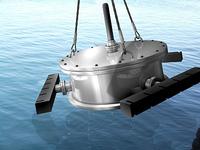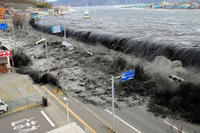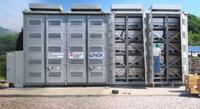-
DSIT in $12.3 million order for underwater security systems

DSIT Solutions receives its largest order ever for underwater security systems; the contract calls for the delivery of a large number of AquaShield Diver Detection Sonar (DDS) and PointShield Portable Diver Detection Sonar (PDDS) systems to protect offshore oil platforms, coastal energy terminals, and high value vessels against underwater intrusion and sabotage
-
-
Protecting U.S. water supplies

Aside from possible cyberatacks on water utilities, security officials are worried that terrorists could contaminate water supplies with volatile chemicals that can poison thousands of individuals and even cause explosions; DHS warned local water utilities of “backpressure” — a simple tactic terrorists could use to introduce a chemical or biological agent into the water supply and spread it over long distances without immediate detection
-
-
Pace University launches new cybersecurity institute
Last week Pace University announced that it had launched a special institution aimed at helping the United States alleviate the critical shortage of cybersecurity professionals and secure the nation’s data networks
-
-
Senate stalls on easing visa restrictions for highly skilled immigrants
A bill meant to allow more high-skill immigrants from India and China to obtain green cards has been placed on hold by Senator Charles Grassley (R-Iowa) over concerns that it should do more to “protect Americans at home”
-
-
Japan tsunami waves merged, doubling power

Researchers have discovered that the destructive tsunami generated by the March 2011 Tōhoku-Oki earthquake was a long-hypothesized “merging tsunami” that doubled in intensity over rugged ocean ridges, amplifying its destructive power before reaching shore
-
-
Making sure skyscraper foundations stand up to earthquakes
Engineers are preparing to conduct the first rigorous tests of how the steel columns that secure skyscrapers to their foundations stand up during earthquakes, research that could make the towering structures safer — and perhaps less expensive to build
-
-
Strong ground motion shows need to modify building codes
Population growth and scarcity of undeveloped metropolitan land have changed urban land use patterns and placed an increasing number of people and infrastructure in areas susceptible to topographic effects during earthquakes; building codes should take such trends into account
-
-
NERC CIP-compliant grid security reporting tool
NERC CIP Standard is a comprehensive framework of physical and cyber security best practices to safeguard the bulk power system for North America; Skybox Security shows NERC CIP-compliant grid security reporting tool
-
-
U.S. critical infrastructure security response system is broken
Since its inception, DHS has urged states and cities to establish Fusion Centers to collect information from power companies and water utilities about infrastructure-related incidents with national security implications. There are now seventy-two Fusion Centers in the United States. A recent confusion about the causes of disruption of an Illinois water utility pump raised question about the effectiveness of the Fusion Center information collection and reporting system.
-
-
Portable wastewater system generates energy, produces drinking water

Researchers are working to develop a portable wastewater treatment system that could improve the military’s efficiency; the solar-bio-nano project also will generate energy and produce drinking water, thus providing a potential blueprint for the future of municipal/agricultural wastewater treatment systems
-
-
U.K. unveils new cyber defense strategy
The U.K. government last week published its new Cyber Security Strategy; the government said the new strategy sets out “how the United Kingdom will support economic prosperity, protect national security, and safeguard the public’s way of life”
-
-
House Intelligence panel investigates Chinese telecom giants

As Chinese telecom giants Huawei Technologies Co. and ZTE Corp continue to eye the lucrative American market, they have come under increasing scrutiny from U.S. lawmakers who fear their technology could be used by Chinese hackers to steal U.S. secrets; the two Chinese companies are now the subject of a House Intelligence Committee investigation aimed at determining whether they are a threat to the United States
-
-
Sector Report for Monday, 28 November 2011: Infrastructure protection
This report contains the following stories.
-
-
DHS: Hackers did not cause Illinois water pump to fail
Cybersecurity experts and critical infrastructure operators can rest a bit easier now that DHS investigators have determined there is nothing to suggest that hackers caused a water pump to fail in Springfield, Illinois
-
-
Large-scale power storage for the energy grid

The sun does not always shine and the wind does not always blow; Stanford University researchers have used nanoparticles of a copper compound to develop a high-power battery electrode that is inexpensive to make, efficient and durable that it could be used to build batteries big enough for economical large-scale energy storage on the electrical grid
-
More headlines
The long view
Water Wars: A Historic Agreement Between Mexico and US Is Ramping Up Border Tension
As climate change drives rising temperatures and changes in rainfall, Mexico and the US are in the middle of a conflict over water, putting an additional strain on their relationship. Partly due to constant droughts, Mexico has struggled to maintain its water deliveries for much of the last 25 years, deliveries to which it is obligated by a 1944 water-sharing agreement between the two countries.
Trump Is Fast-Tracking New Coal Mines — Even When They Don’t Make Economic Sense
In Appalachian Tennessee, mines shut down and couldn’t pay their debts. Now a new one is opening under the guise of an “energy emergency.”
Smaller Nuclear Reactors Spark Renewed Interest in a Once-Shunned Energy Source
In the past two years, half the states have taken action to promote nuclear power, from creating nuclear task forces to integrating nuclear into long-term energy plans.
Keeping the Lights on with Nuclear Waste: Radiochemistry Transforms Nuclear Waste into Strategic Materials
How UNLV radiochemistry is pioneering the future of energy in the Southwest by salvaging strategic materials from nuclear dumps –and making it safe.
Model Predicts Long-Term Effects of Nuclear Waste on Underground Disposal Systems
The simulations matched results from an underground lab experiment in Switzerland, suggesting modeling could be used to validate the safety of nuclear disposal sites.
